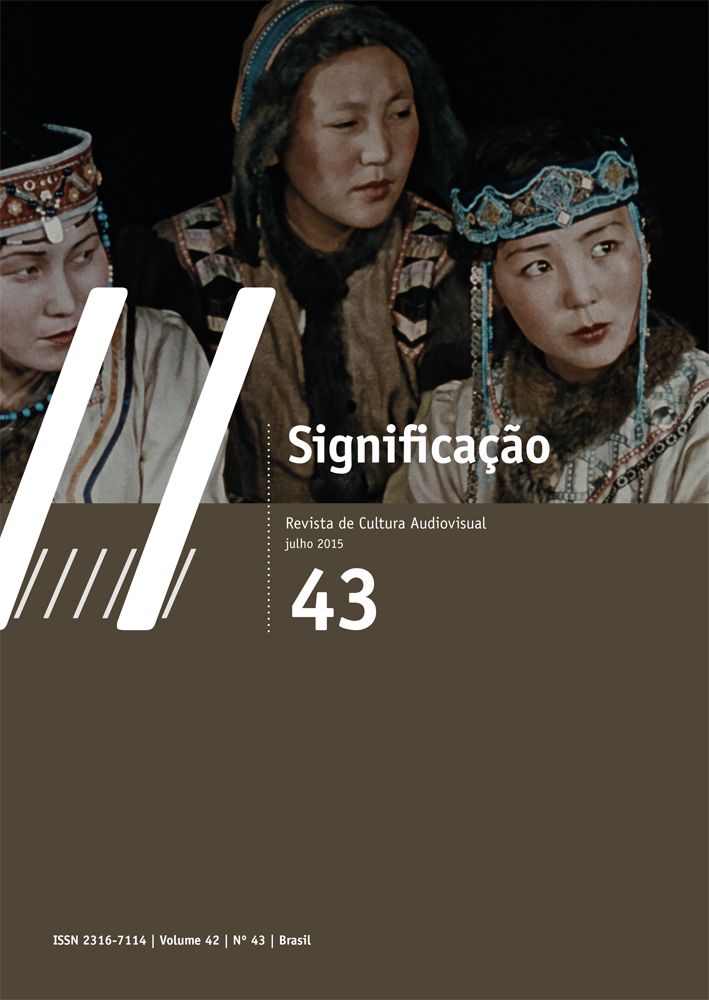Points of view on people and race in Brazilian cinematographic field during the 1950s: the thesis of Solano Trindade and Nelson Pereira dos Santos
DOI:
https://doi.org/10.11606/issn.2316-7114.sig.2015.90223Keywords:
Brazilian Cinema, intellectuals, race, ethnicityAbstract
This article aims to address two thesis presented in the Congress of the Brazilian Film in the 1950s to relate them to the beggining of formation of the Brazilian cinematographic field. More precisely, we will analyze Folclore e Cinema, thesis defended by Solano Trindade in the I Congresso Nacional do Cinema Brasileiro; and O problema do conteúdo no cinema brasileiro, presented by Nelson Pereira dos Santos in the I Congresso Paulista do Cinema Brasileiro. From them, we will analyze which images of Brazilian people these thesis articulated in their defenses. Our hypothesis is that, in order to use Gilberto Freyre’s ideas, these intellectuals chose the image of the Brazilian people as a racially, ethnically and culturally heterogeneous people, but in the process of integration. This is not to say that they only reproduce these ideas, but actively used in shaping the habitus of cinematographic field at that time.
Downloads
References
AUTRAN, Arthur. Alex Viany: crítico e historiador. São Paulo: Perspectiva, 2003.
BASTOS, Élide Rugai. As criaturas de Prometeu: Gilberto Freyre e a formação da sociedade brasileira. São Paulo: Global, 2006.
BERNARDET, Jean-Claude. Historiografia clássica do cinema brasileiro. São Paulo: Annablume, 1995.
_______________________. Cinema brasileiro: propostas para uma história. São Paulo: Paz e Terra, 1994.
BERNARDET, Jean Claude e GALVÃO, Maria Rita. O nacional e o popular na cultura brasileira - cinema. São Paulo-Rio de Janeiro: Brasiliense-EMBRAFILME, 1983.
BOURDIEU, Pierre. As Regras da arte. São Paulo, Cia. das Letras, 2005.
_______________. A Economia das trocas simbólicas. São Paulo: Perspectiva, 2005.
DAMATTA, Roberto. Brasil: uma nação em mudança e uma sociedade imutável? In: Estudos Históricos. Rio de Janeiro, CPDOC, 1988.
FERNANDES, Florestan. A Integração do negro na sociedade de classes. São Paulo, Ática, 1978.
FOUCAULT, Michel. A ordem do discurso. São Paulo: Loyola, 1996.
GRAMSCI, Antonio. Os intelectuais e a organização da cultura. Rio de Janeiro, Civilização Brasileira, 1978.
GUIMARÃES, Antônio Sérgio Alfredo. Classes, raças e democracia. São Paulo, Ed. 34, 2002.
JAUSS, Hans Robert. O prazer estético e as experiências fundamentais da Poiesis, Aesthesis e Katharsis. In: LIMA, Luiz Costa (org.). A Literatura e o leitor – textos de estética da recepção. Rio de Janeiro: Paz e Terra, 1979.
MACHADO, Hilda. Rio 40 graus, Rio zona Norte: o jovem Nelson Pereira dos Santos. Dissertação de Mestrado apresentada à ECA-USP. São Paulo, 1987. Orientador: Prof. Dr. José Teixeira Coelho Neto.
NASCIMENTO, Abdias do (editor). Quilombo: vida, problemas e aspirações do negro. São Paulo: Ed. 34, 2003.
RAMOS, Alberto Guerreiro. Introdução crítica à sociologia brasileira. Rio de
Janeiro: UFRJ, 1995.
SALEM, Helena. Nelson Pereira dos Santos: o sonho possível do cinema brasileiro. Rio de Janeiro, Nova Fronteira, 1987.
SKIDMORE, Thomas. O Brasil visto de fora. São Paulo, Paz e Terra, 2001.
_________________. Preto no branco: raça e nacionalidade no pensamento brasileiro. Rio de Janeiro, Paz e Terra, 1976.
SCHWARCZ, Lilia Moritz. O Espetáculo das raças. São Paulo: Cia. das Letras, 2005.
SOUZA, José Inácio de Melo. Congressos, patriotas e ilusões e outros ensaios de cinema. São Paulo: Linear B, 2005.
Downloads
Published
Issue
Section
License
Copyright (c) 2015 Pedro Vinicius Asterito Lapera

This work is licensed under a Creative Commons Attribution-NonCommercial 4.0 International License.
Authors who publish in this journal must agree with the following terms:
- Authors keep their copyrights and grant the journal first time publication rights, having their articles simultaneously licensed under the Creative Commons Attribution License, which allows sharing texts with authorship recognition and first publication on this journal for non-commercial purposes.
- Authors are allowed to make additional contracts, for a non-exclusive distribution of the article’s version published on this journal (e.g.: publishing in institutional repositories of articles or as a book chapter), with authorship recognition and first publication on this journal.
















